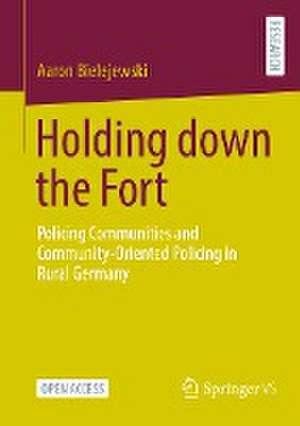Holding down the Fort: Policing Communities and Community-Oriented Policing in Rural Germany
Autor Aaron Bielejewskien Limba Engleză Paperback – 28 noi 2022
Preț: 358.79 lei
Nou
Puncte Express: 538
Preț estimativ în valută:
68.66€ • 71.86$ • 57.14£
68.66€ • 71.86$ • 57.14£
Carte tipărită la comandă
Livrare economică 31 martie-14 aprilie
Preluare comenzi: 021 569.72.76
Specificații
ISBN-13: 9783658397722
ISBN-10: 3658397721
Pagini: 418
Ilustrații: X, 418 p. 1 illus. in color. Textbook for German language market.
Dimensiuni: 148 x 210 mm
Greutate: 0.51 kg
Ediția:1st ed. 2023
Editura: Springer Fachmedien Wiesbaden
Colecția Springer VS
Locul publicării:Wiesbaden, Germany
ISBN-10: 3658397721
Pagini: 418
Ilustrații: X, 418 p. 1 illus. in color. Textbook for German language market.
Dimensiuni: 148 x 210 mm
Greutate: 0.51 kg
Ediția:1st ed. 2023
Editura: Springer Fachmedien Wiesbaden
Colecția Springer VS
Locul publicării:Wiesbaden, Germany
Cuprins
Introduction.- Our town: the sociology of policing communities.- Setting the stage: setting, method, and perspective.- Framing police encounters: the dramaturgy of authority.- Violence and the police.- Community tales: storytelling, experience, and local knowledge.- The police and community maintenance.- Postscript: retrospective auto-ethnography.
Notă biografică
Aaron Bielejewski is a research associate at the Centre for Criminological Research Saxony. He studies cultural and interactionist aspects of police work and prison.
Textul de pe ultima copertă
This Open-Access-book questions the relationship between institutionalized images and understandings of policing – the monolithic ideas common to most, if not all, Western law enforcement agencies – and contextual, situative, and local interactions where the human representatives of policing – street-level officers – come into contact with residents. The political and theoretical association of specific forms of “Western” policing with democratic society can be illustrated in the case of German integration: narratives of reform and essentially forging new democratic police agencies in the “new German states” stand at odds with much of the experience and statements of officers who continued to serve following (Re)Unification. Officers who present their works primarily in terms of their local responsibilities, expectations and more specifically to their unique and individual relationship and connection to their communities downplay the relevance of high-level policing policy. Based on atwo-year ethnographic study of policing in a rural county in the German state of Brandenburg, this book explores the local nature of policing both in terms of how police officers imagine their communities to be and with reference to broader societal expectations and assumptions of what police, essentially, are, can effectively do, and should effectively do.
About the author
Aaron Bielejewski is a research associate at the Centre for Criminological Research Saxony. He studies cultural and interactionist aspects of police work and prison.
Aaron Bielejewski is a research associate at the Centre for Criminological Research Saxony. He studies cultural and interactionist aspects of police work and prison.
Caracteristici
This book is open access, which means that you have free and unlimited access
